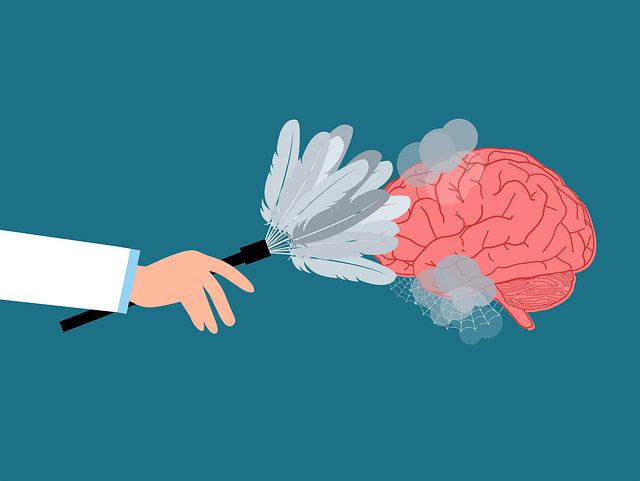Louisville Child Abuse Therapy goes beyond traditional talk therapy by incorporating evidence-based practices like mindfulness, creative outlets, and tailored Mental Wellness Coaching Programs to empower children and adolescents with essential coping skills. These initiatives support recovery from trauma, prevent mental health issues like depression, and promote emotional stability through personalized strategies, cultural sensitivity, and self-care practices. Long-term benefits include enhanced resilience, reduced anxiety levels, and improved emotional well-being for individuals recovering from trauma, accessible through community outreach programs that foster a holistic approach to mental wellness.
Coping skills development is a vital process, especially for children who have experienced trauma or abuse. This article explores the essential role that therapeutic interventions, like those provided by Louisville Child Abuse Therapy, play in building resilience. We delve into understanding coping skills, identifying effective mechanisms, and practical tools to manage stress and anxiety. Additionally, we highlight the long-term benefits of developing these skills in overcoming past traumas.
- Understanding Coping Skills: Building Resilience in Children
- The Role of Louisville Child Abuse Therapy in Teaching Coping Strategies
- Identifying Effective Coping Mechanisms for Emotional Well-being
- Practical Tools for Managing Stress and Anxiety in Daily Life
- Long-term Benefits of Coping Skills Development for Overcoming Trauma
Understanding Coping Skills: Building Resilience in Children

Coping skills are essential tools that help individuals navigate life’s challenges and setbacks. For children, particularly those who have experienced Louisville child abuse therapy, developing robust coping mechanisms is crucial for building resilience and fostering overall mental well-being. Understanding what coping skills entail is the first step towards empowering kids to handle stress, anxiety, and difficult emotions in healthy ways.
Through various therapeutic interventions and public awareness campaigns development, mental health professionals can educate children on different strategies to cope with trauma or adverse experiences. This may include teaching them relaxation techniques, encouraging positive self-talk, and promoting physical activities as outlets for emotional expression. By integrating these coping skills into their daily lives, children gain a sense of control and learn to regulate their emotions effectively. Such initiatives complement risk assessment for mental health professionals, ensuring that at-risk kids receive the necessary support to prevent depression and other mental health issues.
The Role of Louisville Child Abuse Therapy in Teaching Coping Strategies

Louisville Child Abuse Therapy plays a pivotal role in equipping children and adolescents with essential coping skills to navigate life’s challenges. Through specialized programs tailored for young individuals who have experienced trauma, this therapy offers a safe and supportive environment. Here, trained professionals utilize evidence-based practices, such as mindfulness meditation and mind over matter principles, to help clients develop healthy emotional regulation strategies.
These therapeutic interventions go beyond traditional talk therapy. They include creative outlets like art and music therapy, along with structured Mental Wellness Coaching Programs Development. By incorporating these diverse techniques, Louisville Child Abuse Therapy ensures that each child receives personalized support. The ultimate goal is to empower them with the tools necessary to manage stress, process emotions, and build resilience, ultimately fostering their mental wellness in a nurturing and compassionate setting.
Identifying Effective Coping Mechanisms for Emotional Well-being

Identifying effective coping mechanisms is a pivotal step in fostering emotional well-being, especially for individuals who have experienced traumatic events like Louisville child abuse therapy. The process involves recognizing what works best for each person. Some may find solace in creative outlets like art or music, which offer non-verbal channels to express and release emotions. Others might turn to physical activities like yoga or exercise to manage stress and anxiety.
Cultural sensitivity in mental healthcare practice plays a significant role here. Understanding an individual’s cultural background and integrating it into the coping strategies can enhance their effectiveness. For example, incorporating traditional healing practices alongside modern therapy methods may prove more beneficial for some clients. Self-care practices are also essential; ensuring adequate rest, maintaining a balanced diet, and setting boundaries in relationships contribute to robust emotional healing processes.
Practical Tools for Managing Stress and Anxiety in Daily Life

In the context of Louisville child abuse therapy and broader mental wellness initiatives, practical tools like mental wellness journaling and mind over matter principles offer powerful strategies for managing stress and anxiety. Keeping a journal allows individuals to process their thoughts and emotions, serving as an outlet for expression and reflection. This practice can help identify triggers and patterns, fostering self-awareness and coping mechanisms. By documenting experiences and feelings, one gains clarity and perspective, enabling better management of stressful situations.
Additionally, adopting mind over matter principles involves reshaping one’s mindset to cultivate resilience. Encouraging positive affirmations, reframing negative thoughts, and focusing on breathing techniques can significantly reduce anxiety levels. These practices promote self-esteem improvement by instilling a sense of control and empowerment. Louisville child abuse therapy programs often integrate such exercises into their guidance, equipping individuals with practical tools to navigate daily life’s challenges more effectively.
Long-term Benefits of Coping Skills Development for Overcoming Trauma

The long-term benefits of coping skills development are profound, especially for individuals who have experienced trauma, such as those seeking Louisville child abuse therapy. By equipping oneself with effective coping mechanisms, one can significantly reduce the adverse effects of traumatic events. These skills enable people to navigate challenging situations with resilience and emotional stability, ultimately fostering mental wellness.
Mental wellness coaching programs focus on exactly this—development. They provide individuals with tools to recognize and manage stress, anxiety, and other symptoms that may arise from past traumas. Through these programs, one can learn healthy ways to express emotions, build self-confidence, and improve overall quality of life. Additionally, community outreach program implementations can further enhance access to such support, making it easier for those in need to find help and recovery. This holistic approach to coping skills development is a game-changer in the field of trauma recovery, offering long-lasting protection against depression prevention and promoting a brighter, more resilient future.
Coping skills development, as highlighted by Louisville Child Abuse Therapy, is a vital tool for fostering resilience in children. By understanding and practicing effective coping mechanisms, individuals can enhance their emotional well-being and manage stress and anxiety in daily life. The long-term benefits of such development are profound, offering a means to overcome trauma and build a more resilient and balanced future.














